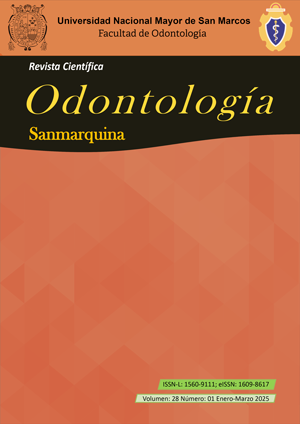Design and content validity of an instrument for analysis of teacher identity
DOI:
https://doi.org/10.15381/os.v28i1.30213Keywords:
Validation Study, Surveys and Questionnaires, Faculty, Teaching, EducationAbstract
Objective: Design a questionnaire for the analysis of teacher identity and validate its content. Methods: theoretical review of the concepts for the creation of the questionnaire: educational trends and norms and the method of expert judgment for the evaluation of the items based on pertinence, relevance, clarity and sufficiency. The statistical indices of content validity were used Aiken's V coefficient and Content Validity Index (CVI) of Lawshe (1975) modified by Tristán-López 2008. Results: The concept of teaching identity was defined as “the teacher's self-reflection about their teaching work and relationship they establish with their immediate, institutional and work context”, and the specifications for the use of the questionnaire were developed. The wording of the 33 items was improved and the final version of the instrument after the evaluation by the expert judges and the quantitative analysis left with 6 general questions and 40 specific reagents, distributed in three dimensions: disciplinary 5 reagents, didactic pedagogical 23 and institutional and work context 12 reagents. Conclusion: It was concluded that the design and content evaluation of the instrument contributed to the evidence of validity of the instrument for analysis of teacher identity
Downloads
References
Vega-Lugo N, Flores-jiménez R, Flores-jiménez I, Hurtado-vega B, Rodríguez-martínez JS. Teorías del aprendizaje Theories of Learning. XICUA Boletín científico la Esc Super Tlahuelipan. 2019; (14): 51-53. DOI: https://doi.org/10.29057/xikua.v7i14
Moreno Martín G, Martínez Martínez R, Moreno Martín M, Fernández Nieto MI, Guadalupe Núñez SV. Acercamiento a las Teorías del Aprendizaje en la Educación Superior. Uniandes Episteme Rev Ciencia, Tecnol e Innovación. 2017; 4(1): 48-60. http://45.238.216.13/ojs/index.php/EPISTEME/article/view/346/260
Zapata-Ros M. Teorías y modelos sobre el aprendizaje en entornos conectados y ubicuos. Bases para un nuevo modelo teóricoa partir de una visión crítica del “conectivismo”. Educ Knowl Soc. 2015; 16(1): 69-102. https://dialnet.unirioja.es/servlet/articulo?codigo=5037538
Torres M, Inciarte A. Aportes de las teorías del aprendizaje al diseño instruccional. Telos. 2005; 7(3): 349-362.
Tenango C, Solis E. Diseño y validación de un instrumento de evaluación del compromiso docente en educación media superior. Cienc Lat Rev Científica Multidiscip. 2022; 6(4): 1201-1223. doi: https://doi.org/10.37811/cl_rcm.v6i4.2656
Lentillon-Kaestner V, Guillet-Descas E, Martinent G, Cece V. Validity and reliability of questionnaire on perceived professional identity among teachers (QIPPE) scores. Stud Educ Eval. 2018; 59: 235-243. doi: https://doi.org/10.1016/j.stueduc.2018.09.003
Al-Zadjali FHA. The Impact of Curriculum Prescription on English Teacher Professional Identity in Oman. 2017;(June).
Bakieva M. Diseño y validación de un istrumento para evaluar la colegialidad docente. Tesis Dr. Published online 2016. https://core.ac.uk/download/pdf/75988902.pdf
Gómez F. La Identidad profesional de los profesores de matemáticas y ciencias sociales en la educación secundaria. (Tesis Dr en Psicol la Educ. Published online 2015. http://www.tesisenred.net/handle/10803/377472
Chen H. A Chinese beginning teacher’s professional identity transformation: An auto-ethnographic study. Published online 2011.
Fajardo JA. Teacher Identity Construction: Exploring the Nature of Becoming a Primary School Language Teacher.; 2011. Accessed April 3, 2021. https://core.ac.uk/download/pdf/40013454.pdf
Arriaga J, Carpeño A, Castejón MÁ, et al. INFORME FINAL (EA 2009-0092). Desarrollo de un sistema de indicadoresde calidad para la evaluación de la actividad docente universitaria. Published online 2009.
Argibay JC. Técnicas psicométricas. Cuestiones de validez y confiabilidad. Subj y Procesos Cogn. 2006; (8): 15-33.
American Educational Research Association A, American Psychological Association A, National Council on Measurement in Education N. Estándares Para Pruebas Educativas y Psicológicas (M. Lieve, Trans.). American Educational Research Association, AERA; 2018. doi: https://doi.org/10.2307/j.ctvr43hg2
Pedrosa I, Suárez-Álvarez J, García-Cueto E. Evidencias sobre la validez de contenido: avances teóricos y métodos para su estimación. Acción Psicológica. 2014; 10(2): 3 20. doi: https://dx.doi.org/10.5944/ap.10.2.11820
Tardif,Maurice y Cantón I. Introducción. In: Cantón Mayo I, Tardiff M, eds. Identidad Profesional Docente. Narcea S.A. 2018; 125-140.
Aiken LR. Three coefficients for analyzing the reliability and validity of ratings, educational and psychological measurument. Educ Psychol Meas. 1985; 45(1): 131-142.
Penfield RD, Giacobbi PR. Applying a score confidence interval to Aiken’s item content-relevance index. Meas Phys Educ Exerc Sci. 2004; 8(4): 213-225. doi: https://doi.org/10.1207/s15327841mpee0804_3
Juárez-Hernández LG, Tobón S. Análisis de los elementos implícitos en la validación de contenido de un instrumento de investigación. Espacios. 2018; 39(53).
Tristán-López a. Modificación al modelo de Lawshe para el dictamen cuantitativo de la validez de contenido de un instrumento objetivo. Av en medición. 2008; 6: 37-48.
Soriano AM. Diseño y validación de instrumentos de medición. Diálogos. 2014; (14): 19-40.
Beneitone P, Esquetini C, González J, Marty M, Suifi G, Wagenaar R. Informe Final Proyecto Tuning - América Latina: Reflexiones y Perspectivas de La Educación Superior En América Latina 2004-2007. 2007;430p
Ministerio de Educación CN de E. Proyecto educativo nacional PEN 2036. Repos del Minist Educ. 2020; 0(0): 1-181. https://www.cne.gob.pe/uploads/publicaciones/2020/proyecto-educativo-nacional-al-2036.pdf
Ministerio de Educación del Perú S. Política Nacional de Educación Superior y Técnico-Productiva.Resumen.; 2020. https://www.gob.pe/institucion/minedu/informes-publicaciones/1129291-politica-nacional-de-educacion-superior-y-tecnico-productiva
Gee JP. Identity as an analytic lens for research in education. Rev Res Educ. 2000; 25: 99-125. doi: https://doi.org/10.3102/0091732x025001099
Triado X. Manual de docencia universitaria. In: Max Turull (Coord). Manual de Docencia Universitaria. Octaedro. IDP/ ICE, UB. 2020:11-22. https://dialnet.unirioja.es/servlet/articulo?codigo=7676942
Olave S. Revisión del concepto de identidad profesional docente. Rev Innova Educ. 2020; 2(3): 378-393. doi: https://doi.org/10.35622/j.rie.2020.03.001
Dominguez-Lara S. Cartas al editor. Arch Argent Pediatr. 2016; 114(3): e221-e223.
Escobar-Pérez J, Cuervo-Martínez. Validez de contenido y juicio de expertos: Una aproximación a su utilización. 2017; (September).
Downloads
Published
Issue
Section
License
Copyright (c) 2025 Marieta Petkova-Gueorguieva

This work is licensed under a Creative Commons Attribution 4.0 International License.
AUTHORS RETAIN THEIR RIGHTS:
a. Authors retain their trade mark rights and patent, and also on any process or procedure described in the article.
b. Authors retain their right to share, copy, distribute, perform and publicly communicate their article (eg, to place their article in an institutional repository or publish it in a book), with an acknowledgment of its initial publication in the Odontología Sanmarquina.
c. Authors retain theirs right to make a subsequent publication of their work, to use the article or any part thereof (eg a compilation of his papers, lecture notes, thesis, or a book), always indicating the source of publication (the originator of the work, journal, volume, number and date).






